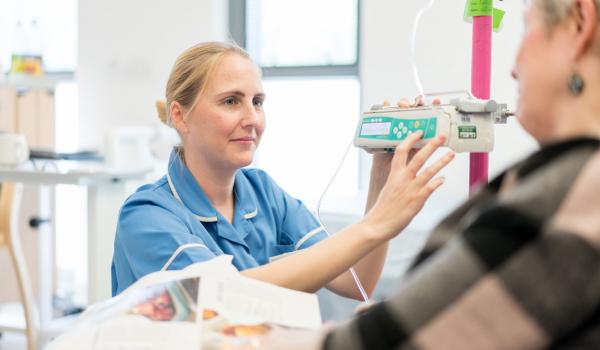KEYNOTE-B96 : A Phase 3, Randomized, Double-Blind Study of Pembrolizumab Versus Placebo in Combination With Paclitaxel With or Without Bevacizumab for the Treatment of Platinum-resistant Recurrent Ovarian Cancer (KEYNOTE-B96/ENGOT-ov65)
Who can take part
Please note - unless we state otherwise in the summary, you need to talk to your doctor about joining a trial.
You may be able to take part in this trial if you:
- are 18 years old or over
- have epithelial ovarian, fallopian tube or primary peritoneal cancer
- have platinum resistant disease
- have received one or two previous courses of chemotherapy
- have good overall fitness levels and organ function
People with borderline or mucinous type tumours are not able to take part in this trial. You can be considered for the trial if you have had a parp inhibitor and or bevacizumab (avastin) in the past.
This is not an exhaustive list. If you're interested in participating in a clinical trial, you should speak to your doctor about what other criteria might apply.
About the trial
Researchers in this study are trying to find out if treating platinum resistant ovarian cancer with an immunotherapy drug called embrolizumab and the chemotherapy drug paclitaxel is better than just treating with paclitaxel on it’s own. Platinum resistance means that your cancer no longer responds to platinum based chemotherapy (e.g carboplatin).
They specifically want to find out if those people treated with the study drug pembrolizumab have a longer period of time before they need more treatment for their ovarian cancer than those who don’t receive pembrolizumab.
The drugs involved in this trial are:
- Pembrolizumab – the study drug, a type of immunotherapy drug. It's designed to stimulate the body’s immune system to 'see' and fight the cancer cells. It's approved in the UK as a prescription medicine (sometimes called KEYTRUDA®) to treat skin cancers called malignant melanoma, head and neck cancers, Hodgkin’s lymphoma and non-small cell lung cancer. It's not currently a standard treatment for ovarian cancer.
- Paclitaxel (also known as taxol) – a standard chemotherapy drug.
If you take part in this study, you'll be randomised (placed into a group by a computer) into one of two treatment groups:
Group A (the experimental group)– those in this group will receive pembrolizumab IV (intravenous–given via a needle into a vein) and paclitaxel IV.
Group B (the control group) – those in this group will receive placebo IV (a inactive solution sometimes known as a dummy drug) and paclitaxel IV.
If the investigator feels that you would benefit they can also give participants in either group of this trial the drug bevacizumab (also known as avastin).
You will continue to receive the trial treatments for as long as they are helping to control your cancer and you are tolerating the treatment.



